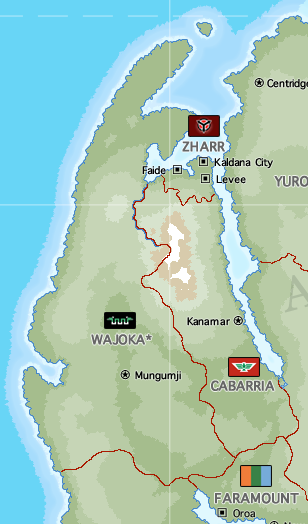Wajoka
Wajoka | |
|---|---|
|
Flag | |
 Map of Wajoka | |
| Capital | Mungumji |
| Legislature | Tributary Council |
This article is incomplete because it is pending further input from participants, or it is a work-in-progress by one author. Please comment on this article's talk page to share your input, comments and questions. Note: To contribute to this article, you may need to seek help from the author(s) of this page. |
Wajoka is a country on Eurth.
(1st paragraph. Name. Location. Borders. Approx population and size. Capital city.)
(2nd paragraph. Political system. Short history in 1 sentence. Link with present in 1 sentence. Head of state.)
(3rd paragraph. Economy in 2 sentences. International relations in 1 sentence.)
Etymology
(WIP.)
The name of which comes from the phrase "Wapanda farasi wa Joka", "Riders of the Dragon".[1]
Geography
(WIP. Landscape. Climate.)
Wajoka is divided by the northern lightly populated desert and the central and southern savannah grasslands. In the south along the south-central valley are long stretches of savannah forests where much of the population and urbanisation of the country is found, along with the capital of Mungumji (City of Mungu/God).[1]
History
(WIP.)
- Ancient history — Wajoka is an ancient power in Azania, with records of past Wajokan empires existing as far back as Aroman records.
- Medieval — Pre-1000s Wajoka was considered an expansionary power often attempted to conquer and annexed Cabarria and down south into modern day Faramount and Afropa.
- 1100s — However past 1100 the Wajokan Himayas collapsed into infighting and eventually completely dissolved into smaller tribal states.
- 1300s — From the early 1300s to early 1400s a new power, calling itself Wa Joka ("The Dragon") begin to rise out of the ashes of the dead Himayas to begin the reconquest and reformation of the Wajoka Himaya.
- 1413 — However once it reached it's current modern borders by 1413, Wa Joka fell into a lull of territorial isolationism, only allowing foreigners into the country if they were merchants or diplomats.
- 1800s — Even through the late modern period Wajoka (as it began to be called) remained semi-isolationist as a culture and as a people, only attempting to conquer Cabarria twice in 1849 and 1871.
- 2000s — It was only the arrival of the Europan Financial Crisis in the mid-2000s did Wajoka stir, as one of the few economically stable states due to its few connections to the outside wurld, Wajoka found itself as a new potential player in Azanian and even Adlantic politics, although has only made small moves in the form of expanding trade. Although with a growing urbanising population, if Wajoka was to ever seek out a modern empire. Now is the time.[1]
Politics
(WIP. Government. Political parties. Foreign relations. Military.)
Wajoka is, by law, a Himaya, and does divide its empire into 12 tributaries and only the south-central valley being 'core Wa Joka'. But the nation is largely democratic and equal due to the little differences in culture between central Wa Joka and the wider Wajokan population. Every 8 years the population votes for members of the Tributary Council, a parliament/senate like body that acts as the main judiciary and legislative body of the Himaya. The Emperor of Wajoka rarely intervenes in politics, preferring to take a constitutional role in the nation.[1]
Economy
(WIP. Eployment. Exports. Energy. Transport. Media. Currency.)
A large proportion of Wajoka’s economy is derived from plant and pulp export, along with wood from its massive logging and palm oil / Soybean plantations. Much of it’s original Savannah forests have been deforested and replaced with said plantations. A secondary export is of dyes, particularly a very intense black dye used for ink pens, known as Joka Black.
Wajoka is known to have large untapped oil reserves, with only 10% of it being actively drilled for.[1]
Demographics
(WIP. Ethnic groups. Language. Religion. Health. Education.)
Primarily based off the Swahili people, although replace Arabic influence with Latin from the Aroman Empire and English from Cabarria. The Wajokans follow a faith called Wajism, which can be summed up to be in a belief in a great eastern city, home to the Gods, situated where the Sun rises from the Eurth every day. It is fabled the sun’s rise comes out of some far eastern mountains known only as the “Milima ya Mungu” (God’s Mountains).[1]
Cultures
(WIP. Literature. Visual arts. Music. Cuisine. Sport.)
